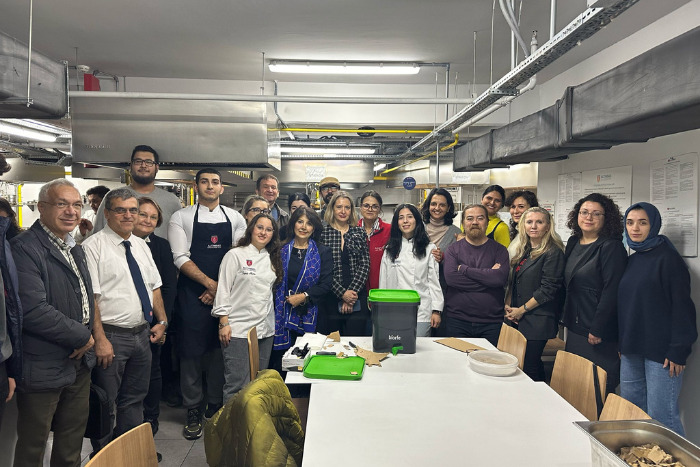INSTITUTES
1% What Does Carbon Boosting Do?
Water scarcity is at dangerous levels... While the importance of water is increasing, it is possible to increase efficiency with compost from organic waste... With this awareness and zero waste approach, the "Sustainability and Composting" course started

Altınbaş University's Faculty of Business and Faculty of Applied Sciences, along with the Gastronomy and Culinary Arts Department, have initiated a collaboration to raise awareness among students about the recycling of waste. The university is introducing a new course to the curriculum focusing on compost production, specifically using the "Bokashi Compost" method.
Bokashi Compost is a type of organic fertilizer that can be produced at home, in schools, factories, or virtually any location where organic waste is generated. The production involves utilizing a variety of materials, including eggshells, coffee grounds, kitchen waste, and even cardboard or sawdust. This compost, made from tons of organic waste generated annually, can fertilize 7 acres of land with just 1 cubic meter.
The collaboration with the Tarım Rotary Club, an external stakeholder of the Faculty of Business, aims to teach students about the responsible disposal of kitchen waste and the production of compost. The course will be integrated into the curriculum, and within the framework of Scientific Research Projects (BAP), new projects will be developed.
The first practical lesson of the program, which aims to enable chef candidates and managerial chefs to manage their kitchens more efficiently, involved the production of "Bokashi Compost" and was attended by Dr. Semra Kaymak, the President of the Tarım Rotary Club.
Dr. Semra Kaymak, who resides in Basel, Switzerland, emphasized the importance of composting and shared that in Switzerland, there are compost production centers in every canton, and as a result, there is virtually no waste in households; everything is returned to the soil.
Dr. Mehmet Gürel Tekelioğlu, a faculty member of the Faculty of Business specializing in the environmental impact of compost production, pointed out that the Bokashi method provides plants with essential nutrients such as phosphorus, potassium, and nitrogen in an optimal way. He highlighted that this approach allows for the transformation of 99% of the waste, ensuring the soil's structure and preventing the formation of pests and insects.
The program, designed to reduce waste and promote sustainable practices, involves students in innovative projects focused on developing products from kitchen waste. The integration of such practices into the curriculum is seen as an essential step toward creating awareness about ecological education and eco-friendly practices.
Dr. Özge Seçmeler, the Head of the Gastronomy and Culinary Arts Department, emphasized the importance of ecological education, especially in the context of post-earthquake city planning, considering the effects of global warming. She expressed the hope that widespread ecological education in schools and universities could contribute to the success of transitioning to "ecological city planning" and increase the involvement of the local community.
Dr. Semra Kaymak explained the benefits of composting, stating that in addition to waste reduction, composting contributes to the soil's quality and fertility, making it more resistant to erosion. She emphasized that the composting process could lead to water savings, as every 1% increase in soil carbon content allows for the retention of an additional 170 tons of water per hectare.
Dr. Semra Kaymak provided practical information on how to make Bokashi compost at home, emphasizing that this method is simple, cost-effective, and odor-free. She stressed that Bokashi composting could be used as a natural fertilizer for home gardening, offering high yields in pots or balconies. The composting process involves fermenting organic waste with beneficial natural microorganisms, resulting in nutrient-rich soil.
The initiative aims to contribute to the reduction of inorganic fertilizer use, decrease environmental pollution, and encourage sustainable practices in agriculture. The course's practical applications and projects align with the "zero waste" approach, focusing on the responsible disposal and recycling of organic waste, ultimately promoting a more sustainable and eco-friendly lifestyle.

